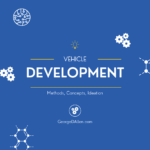Innovation In Comprehensive Risk Management: New Occupant Safety

Effective Risk Management
In the dynamic landscape of engineering projects, effective Risk Management is paramount to success. Further, this article explores strategies and innovations in risk management, addressing challenges and leveraging advancements to mitigate uncertainties and optimize outcomes.
Understanding Risk Management:
Risk Management is the proactive identification, assessment, and mitigation of potential risks throughout the lifecycle of an engineering project. Furthermore, by systematically addressing uncertainties, engineers can minimize disruptions, ensure project delivery within budget and schedule, and enhance stakeholder satisfaction.
Incorporating Advanced Technologies:
Innovations such as artificial intelligence (AI) and predictive analytics are revolutionizing Risk Management in engineering projects. Moreover, AI algorithms analyze vast datasets to identify patterns and predict potential risks, enabling proactive decision-making. In addition, Real-time monitoring systems provide continuous updates, allowing project teams to adapt swiftly to emerging challenges.
Practical Applications and Benefits of Effective Risk Management:
The integration of advanced technologies in Risk Management offers numerous benefits. Consequently, improved risk prediction enhances resource allocation and budgeting, reducing the likelihood of costly delays or overruns. Furthermore, proactive risk mitigation minimizes project disruptions, ensuring consistent progress towards project objectives.
Systems Engineering Method
Utilizing Systems Engineering for effective Risk Management involves implementing structured methodologies such as the Systems V model. Overall, this (holistic) approach ensures seamless connectivity between requirements and the sequential development of verification procedures. Transitioning from initial concept to final product, the Systems V model delineates stages of development, each complemented by corresponding verification activities. Beginning with the identification and analysis of requirements, the process progresses through design, implementation, and integration, culminating in validation and testing. The systematic nature of this model allows for early identification and mitigation of potential risks, ensuring that deviations from requirements are promptly addressed. Verification procedures encompass both virtual simulations and physical testing, providing comprehensive validation of system functionality and performance.
General Reference to System V: https://en.wikipedia.org/wiki/V-model
Reference to the Systems Engineering Method: https://georgedallen.com/navigating-chaos-systems-engineering-in-vehicle-occupant-sensing/
Challenges and Considerations
While the adoption of advanced technologies in Risk Management is promising, challenges exist. Data privacy and security concerns must be addressed to safeguard sensitive project information. Additionally, the human element remains crucial, as effective risk management requires interdisciplinary collaboration and expert judgment to interpret AI-generated insights accurately.
Conclusion
In conclusion, effective Risk Management is essential for navigating the uncertainties inherent in engineering projects. By embracing innovations such as AI and predictive analytics, engineers can enhance risk prediction and mitigation, optimizing project outcomes and delivering value to stakeholders. Additionally, by adhering to the Systems V model, engineering teams can effectively manage risks throughout the project lifecycle, ultimately delivering robust and reliable solutions to meet stakeholder needs. With a strategic approach and interdisciplinary collaboration, such as Systems Engineering method, engineering projects can successfully navigate challenges and achieve their objectives.
Example of the missing system level Integration requirements: https://www.clickondetroit.com/news/local/2024/02/06/general-motors-recalls-323k-pickups-for-tailgate-malfunction/
About George D. Allen Consulting:
George D. Allen Consulting is a pioneering force in driving engineering excellence and innovation within the automotive industry. Led by George D. Allen, a seasoned engineering specialist with an illustrious background in occupant safety and systems development, the company is committed to revolutionizing engineering practices for businesses on the cusp of automotive technology. With a proven track record, tailored solutions, and an unwavering commitment to staying ahead of industry trends, George D. Allen Consulting partners with organizations to create a safer, smarter, and more innovative future. For more information, visit www.GeorgeDAllen.com.
Contact:
Website: www.GeorgeDAllen.com
Email: inquiry@GeorgeDAllen.com
Phone: 248-509-4188
Unlock your engineering potential today. Connect with us for a consultation.


